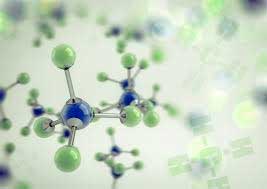In the ever-expanding skin care market, there seems to be a new hype every couple of weeks. Recently, “peptides” has been found coloring the language used in describing breakthrough skin care products. Unlike some of the past trends that haven’t lived up to the hype, peptides are actually well-documented to be effective at nourishing human skin. You may have heard of “collagen,” a component found in skin that provides elasticity and smoothness. Collagen is, in fact, a peptide. It is also an essential ingredient in many of the most popular skin care products worldwide.
What is a peptide, anyway?
 Peptides are chains comprised of two or more amino acids. These amino acid chains serve a variety of functions, from skin and joint care, to muscle repair, and even in the treatment of certain medical ailments.
Peptides are chains comprised of two or more amino acids. These amino acid chains serve a variety of functions, from skin and joint care, to muscle repair, and even in the treatment of certain medical ailments.
How are peptides different from proteins?
 Amino acid chains make proteins, but they also make peptides – so what’s the difference? There are two things that distinguish peptides from proteins: size and overall structure.
Amino acid chains make proteins, but they also make peptides – so what’s the difference? There are two things that distinguish peptides from proteins: size and overall structure.
Peptides are smaller amino acid chains, consisting of 2 to 50 amino acids. Proteins have 50 or more amino acids in their chain.
Additionally, peptides are less defined in structure than proteins. Proteins can achieve incredibly complex formations due to their size.
Basically, proteins are exceptionally large and more structured peptides.
What is collagen?
Collagen is a naturally occurring peptide found in skin. It’s responsible for skin’s youthful appearance and elasticity. As a person ages, the amount of collagen in their skin diminishes over time. This results in wrinkles, sagging, and fine lines.
Collagen is also important in optimal joint health. It helps the areas between your bones to have adequate cushion, which reduces pain and helps stave off certain joint conditions – like arthritis.
How do collagen peptides nurture skin?
 These peptides are designed to encourage the skin to produce its own collagen – without the aid of fillers and cosmetic surgery! When collagen cells die in youthful skin, the body produces more to compensate for the loss. Peptides essentially trick the skin into thinking further collagen has been lost, thus dialing up the skin’s production of this essential compound.
These peptides are designed to encourage the skin to produce its own collagen – without the aid of fillers and cosmetic surgery! When collagen cells die in youthful skin, the body produces more to compensate for the loss. Peptides essentially trick the skin into thinking further collagen has been lost, thus dialing up the skin’s production of this essential compound.
Collagen is important for healthy, radiant and youthful-looking skin. When you better understand what collagen is and how peptides influence its presence in your skin, you can most effectively harness the power of the latest and greatest in cutting-edge skin care products.


Leave a Reply